
In English, there are many hard words to spell, but some are more difficult than most. We’ve collected 14 of the most commonly misspelled words you need to learn.
Even native English speakers can struggle with the variations of the English language. That’s why ProWritingAid is such a useful tool for catching the spelling and grammatical errors that can create a poor impression. ProWritingAid can spot differences between American and British spelling rules, find commonly confused words, and help you learn more about the English language.
These 14 words are fiendishly tricky. Using them correctly is a great way to level-up your writing abilities.
- Word 1: Accommodate
- Word 2: Acquiesce
- Word 3: Bureaucracy
- Word 4: Conscientious
- Word 5: Definitely
- Word 6: Embarrass
- Word 7: Entrepreneur
- Word 8: Ingenious
- Word 9: Manoeuvre
- Word 10: Mischievous
- Word 11: Nauseous
- Word 12: Occurrence
- Word 13: Questionnaire
- Word 14: Unnecessary
- Resources for Improving Your Spelling
Word 1: Accommodate
How Do I Pronounce It?
British English: uh·ko·muh·dayt
American English: uh·kaa·muh·dayt
What Does It Mean?
- 1: To fit in with the needs or preferences of someone.
- 2: Provide sufficient space for a specific amount of people (typically buildings).
What Type of Word Is It?
Example in a Sentence
- The wide doorways accommodate those with limited mobility.
- The holiday home accommodates four people.
How Can I Remember the Spelling?
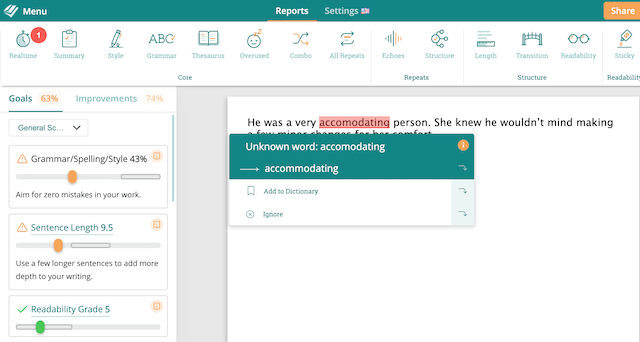
Accommodate is hard to spell because it can be tricky to remember which letters you need to double. It’s common to see it misspelled as "acommodate," "accomodate," and "acomodate".
An easy way to remember that both the "c" and "m" need to be doubled is to think about the meaning of the word. "Accommodate" means making room, so you need to make space for those double letters!
Other Variations of This Word:
- Accommodating: She was very accommodating.
- Accommodated: Students may be accommodated in the halls of residence.
- Accommodation: The accommodation was disappointing.
Word 2: Acquiesce
How Do I Pronounce It?
- British and American English: a·kwee·es
What Does It Mean?
- To accept something without protest but reluctantly.
What Type of Word Is It?
- Verb
Example in a Sentence
- She had to acquiesce to the demands of the business.
How Can I Remember the Spelling?
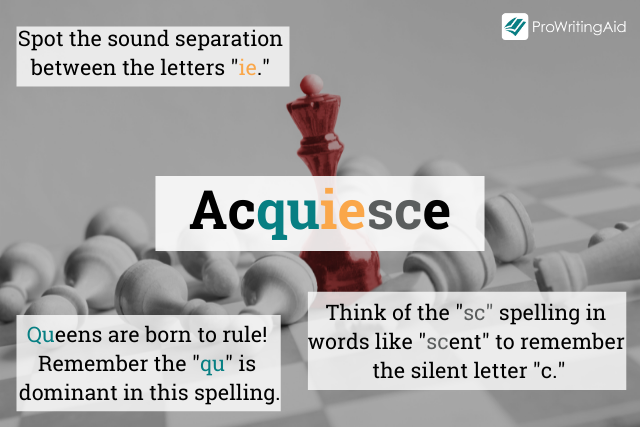
Acquiesce is a truly challenging word, for native English speakers as well as those learning it as an additional language. The first letter "c" isn’t pronounced, which makes it hard to remember. Then there’s the letter "i" making an "ee" sound. Finally the end "ce" isn’t pronounced at all.
So how can you remember it?
- Queens are born to rule! Remember the "qu" is dominant in this spelling.
- Spot the sound separation between the letters "ie". They are not making the same vowel sound.
- Think of the "sc" spelling in words like "scent" to remember the silent letter "c".
Other Variations of This Word:
- Acquiesced: She finally acquiesced to the request.
- Acquiescing: She would not be acquiescing, no matter what they offered.
- Acquiescent: He was acquiescent.
Word 3: Bureaucracy
How Do I Pronounce It?
- British English: byuor·ro·kruh·see
- US English: byoo·raa·kruh·see
What Does It Mean?
- 1: A system of government in which most important decisions are taken by state officials.
- 2: Excessively complicated administrative procedure (often called "red tape").
What Type Of Word Is It?
Example in a Sentence
- The bureaucracy is divided into departments.
- All this bureaucracy stops us from making decisions.
How Can I Remember the Spelling?
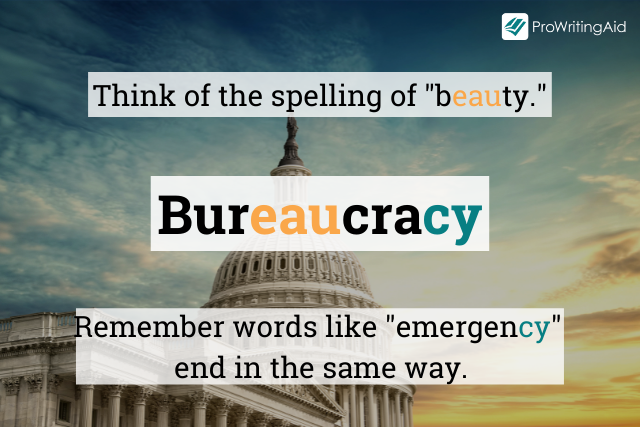
This is a hard word to spell and would have many native English writers reaching for their dictionary.
Splitting the word into two parts can help. The first section "bureau" means an office or department. Look at the "eau" sounds. This is unusual, but it’s also found in the word "beauty."
At the end of the word, the "cy" is making a "see" sound. That’s commonly used in English; think of words like "emergency," "frequency," and "democracy" that all end in the same way.
Other Variations of This Word:
- Bureau: I work for the Citizens Advice Bureau.
- Bureaucratic: This system is too bureaucratic.
- Bureaucrat: We’re fed up with bureaucrats making decisions.
Word 4: Conscientious
How Do I Pronounce It?
- British English: kon·shee·en·shuhs
- American English: kaan·shee·en·shuhs
What Does It Mean?
- 1: Someone who works thoroughly and well.
- 2: Relating to someone’s conscience (moral sense of right and wrong).
What Type Of Word Is It?
Example in a Sentence
- He was a conscientious worker.
- Conscientious objectors refuse to perform military service.
How Can I Remember the Spelling?
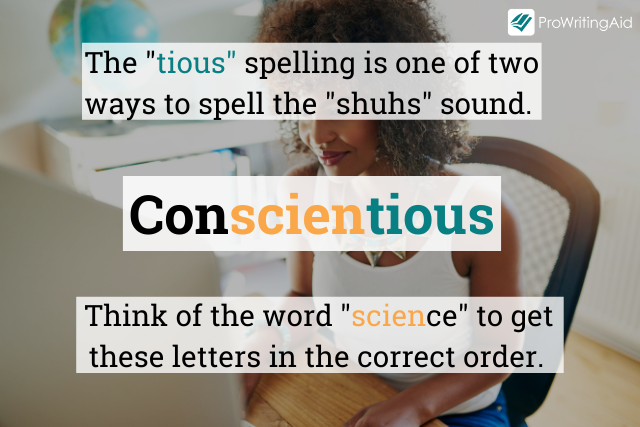
This word is difficult to spell because of the combination of vowels used both in the middle and end of the word.
Look at the "scien" part and think about the spelling of the word "science," but remember they are pronounced differently. The "tious" spelling is one of two ways to spell the "shuhs" sound (the alternative is "cious" as used in "delicious").
Other Variations of This Word:
- Conscience: The decision weighed on her conscience.
- Conscientiously: The painter was known for working conscientiously.
Word 5: Definitely
How Do I Pronounce It?
- British and American English: deh·fuh·nuht·lee
What Does It Mean?
- Without doubt.
What Type of Word Is It?
Example in a Sentence
- We are definitely going out tonight.
How Can I Remember the Spelling?
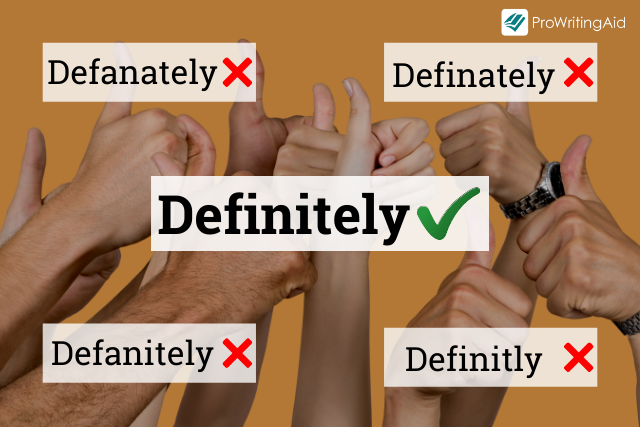
This word looks simple enough, but it’s deceptive because the vowels don’t match the pronunciation of the word. You’ll often spot people adding "a" instead of "i" in error.
It’s helpful to look at a word hidden within this one: "finite". The word "finite" means a specific, measurable amount.
Other Variations of This Word:
- Definite: We had definite plans for the weekend.
- Define: The gate defines the park boundary.
- Definitive: We have come to a definitive decision.
Word 6: Embarrass
How Do I Pronounce It?
- British English: ihm·ba·ruhs
- American English: uhm·beh·ruhs
What Does It Mean?
- Make someone feel self-conscious or ashamed.
What Type of Word Is It?
- Verb
Example in a Sentence
- He wanted to embarrass her.
How Can I Remember the Spelling?
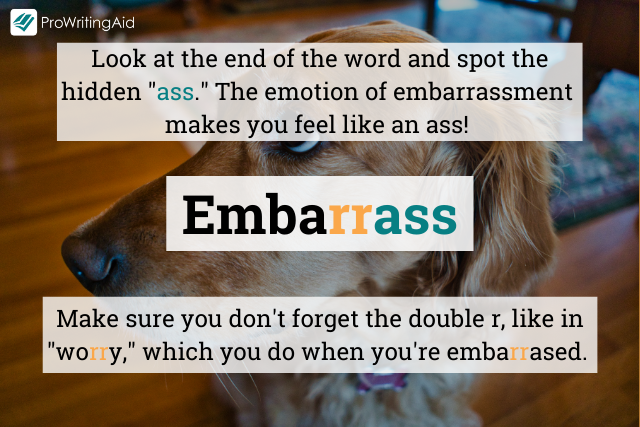
Another deceptively simple word, "embarrass" is often misspelled because the vowels sound closer to an "ee" than an "ay." Add to that the confusion of which letters need to be doubled.
Look at the end of the word and spot the hidden "ass." The emotion of embarrassment makes you feel like an ass! It definitely helps you remember the spelling too.
Other Variations of This Word:
- Embarrassment: The embarrassment was too much to bear.
- Embarrassing: It was an embarrassing situation.
- Embarrassed: He felt so embarrassed by his mistake.
Word 7: Entrepreneur
How Do I Pronounce It?
- British English: on·truh·pruh·nuh
- US English: aan·truh·pruh·noor
What Does It Mean?
- A person who sets up a business.
What Type of Word Is It?
- Noun
Example in a Sentence
- She was a keen entrepreneur.
How Can I Remember the Spelling?

We often think of the word "entrepreneur" as being a French word, but looking back further into its etymology can help us remember the spelling.
The word "entrepreneur" means "to swim out" and "to capture." What a great way to describe someone starting out in a new business.
Other Variations of This Word:
- Entrepreneurial: She showed entrepreneurial instincts.
- Entrepreneurship: The booming economy encourages entrepreneurship.
Word 8: Ingenious
How Do I Pronounce It?
- British and American English: ihn·jee·nee·uhs
What Does It Mean?
- 1: A clever or inventive person.
- 2: A clever machine or idea well suited to its purpose.
What Type of Word Is It?
- Adjective
Example in a Sentence
- What an ingenious man he is!
- The machine was ingenious, yet simple.
How Can I Remember the Spelling?
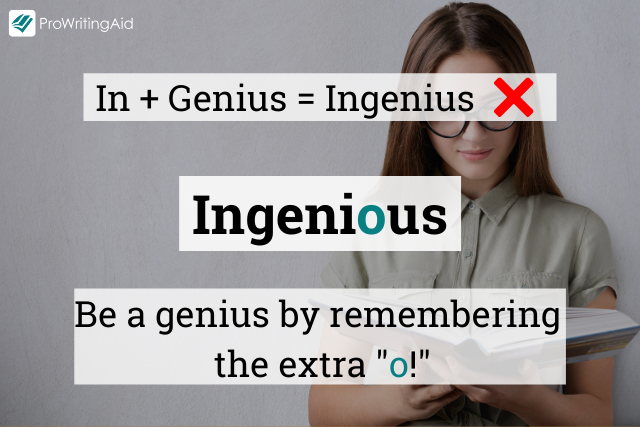
Most people go wrong with the spelling of "ingenious" when they wrongly assume it’s the word "genius" with an "in" at the start. Don’t get tricked out! Remember there’s an "o" there, like in the words, "curious" and "anxious."
Other Variations of This Word:
- Ingenuity: It will take ingenuity to get the design right.
Word 9: Manoeuvre
How Do I Pronounce It?
- British and American English: muh·noo·vuh
What Does It Mean?
- 1: A movement or series of moves requiring skill and care.
- 2: Large-scale military exercises.
- 3: To move skilfully or carefully.
- 4: To carefully manipulate a person or situation to achieve a desired goal.
What Type of Word Is It?
- Noun
- Verb
Example in a Sentence
- The manoeuvre was challenging.
- The artillery were on manoeuvre.
- She could manoeuvre the box around the corner.
- It was easy to manoeuvre him in the meeting.
How Can I Remember the Spelling?

The French origins of this word make it hard to spell accurately. The middle of the word contains a tricky "oeu" you’ll need to learn. Don’t forget the final "vre" needs you to flip the common "er" ending more often used in American English.
Other Variations of This Word:
- Manoeuvrable: The ship was manoeuvrable despite its size.
Word 10: Mischievous
How Do I Pronounce It?
- British and American English: mis·chuh·vuhs
What Does It Mean?
- Causing or enjoying causing trouble in a playful way.
What Type of Word Is It?
- Adjective
Example in a Sentence
- She was a mischievous child.
How Can I Remember the Spelling?
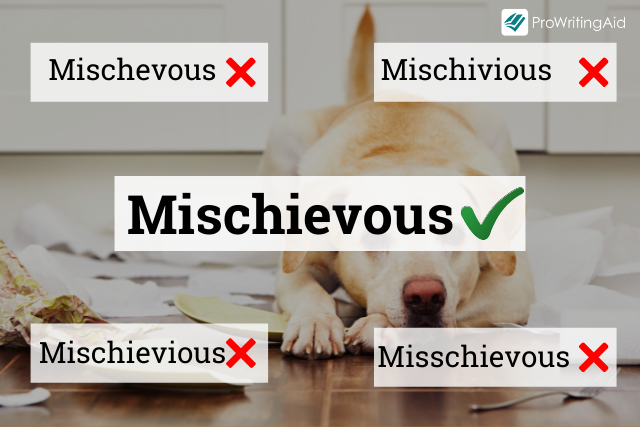
We can’t blame you for getting this spelling wrong. Originally (up until around 1700 CE) it was also spelled "mischievious" and pronounced slightly differently. You’ll still hear people wrongly saying "mis-CHEE-vee-ous."
Try remembering the word "chief" to spell the center of this word.
Other Variations of This Word:
- Mischief: He was the source of all mischief.
Word 11: Nauseous
How Do I Pronounce It?
- British English: naw·zee·uhs
- US English: naa·shuhs
What Does It Mean?
- Feeling (or causing one to feel) sick and/ or needing to vomit.
What Type of Word Is It?
- Adjective
Example in a Sentence
- The smell made her feel nauseous.
How Can I Remember the Spelling?
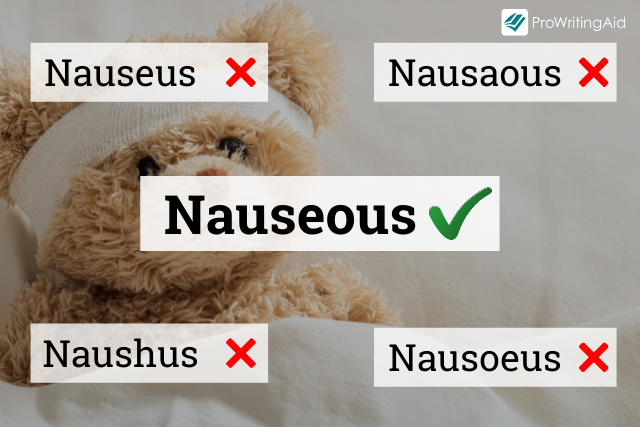
If you speak with a British accent, you’ll find this word much easier to spell as it’s closer to the pronunciation. When you’re writing it, try over-pronouncing the word "naw-SEE-ous" to help you remember the "se" in the middle of the word.
Other Variations of This Word:
- Nausea: A wave of nausea swept over him.
- Nauseated: She felt nauseated just looking at him.
Word 12: Occurrence
How Do I Pronounce It?
- British and American English: uh·kuh·ruhns
What Does It Mean?
- An incident or event.
What Type of Word Is It?
- Noun
Example in a Sentence
- Climate change makes extreme weather a common occurrence.
How Can I Remember the Spelling?
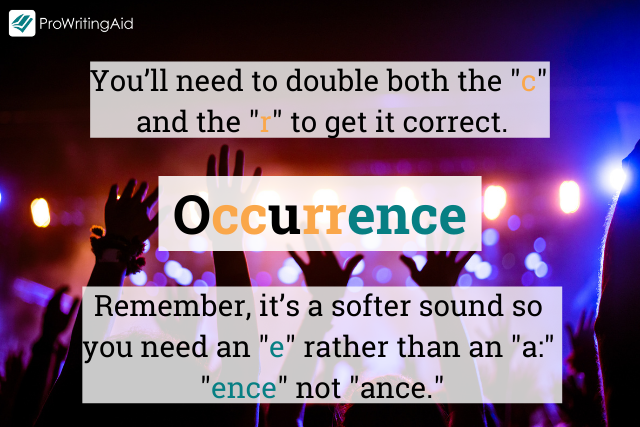
Most people struggle to remember whether they need a "ence" or "ance" ending for this word. Remember it’s a softer sound so you need an "e" rather than an "a."
You might also trip up over which letters need to be doubled. You’ll need to double both the "c" and the "r" to get it correct.
Other Variations of This Word:
- Occurring: The meeting will be occurring weekly.
Word 13: Questionnaire
How Do I Pronounce It?
- British and American English: kwes·chuh·nehr
What Does It Mean?
- A written set of questions with a choice of answers used for gathering data.
What Type of Word Is It?
- Noun
Example in a Sentence
- They used the questionnaire to collect a range of views.
How Can I Remember the Spelling?
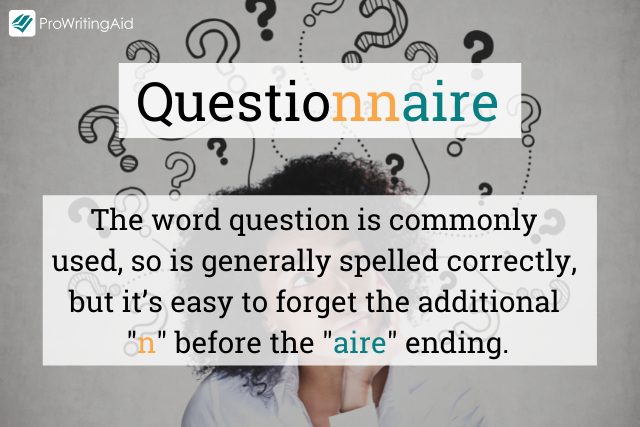
The word question is commonly used, so is generally spelled correctly, but it’s easy to forget the additional "n" before the "aire" ending.
Other Variations of This Word:
- Questionnaires: We wrote several questionnaires.
Word 14: Unnecessary
How Do I Pronounce It?
- British and American English: uhn·neh·suh·seh·ree
What Does It Mean?
- Not needed or excessive.
What Type of Word Is It?
- Adjective
Example in a Sentence
- It was an unnecessary expense.
How Can I Remember the Spelling?
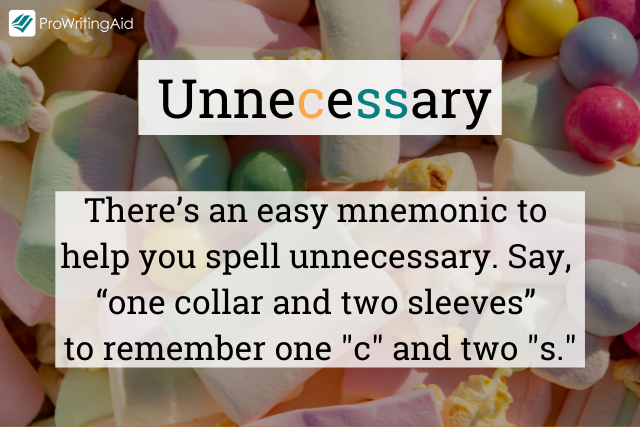
Many people get confused about which letters need to be doubled when you spell "unnecessary," but there’s an easy mnemonic to help. Say, "one collar and two sleeves" to remember one "c" and two "s."
Other Variations of This Word:
- Unnecessaries: His income was too limited for many unnecessaries.
Resources for Improving Your Spelling
English is a difficult language to spell because it’s been influenced by so many other languages. You might feel there are more "exceptions to the rule" than words that follow a particular spelling pattern.
These resources are all great ways to improve your English writing skills:
- Vocabulary.com: Learn words using a wide range of question types and systematic practise.
- English Forward: Explore videos and activities for people learning English as an additional language.
- The Spelling Blog: Johanna Stirling's fascinating blog explores how English works, how to learn it, and how to love it!
Whatever your spelling ability, remember accurate spelling creates a positive impression of your overall competence. It’s worth every effort to make certain it’s correct. And if you’re not sure, ProWritingAid’s comprehensive checker will do the heavy-lifting for you to ensure you always get it right.

